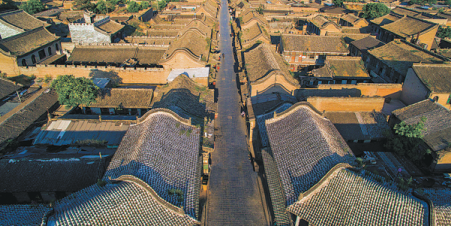Zhaoyu aims to reignite Shanxi merchants' glory

The ancient town of Zhaoyu was a hub for the famed Jinshang merchants in history. [Photo by Zhang Jiong for China Daily]
Qixian county to redevelop town into center of tea culture and tourism
The ancient town of Zhaoyu in Qixian county, Shanxi province, is in line to regain its glory as a hub of the famed Shanxi merchants after local authorities announced an ambitious plan on July 1.
It called for efforts to build Zhaoyu, the county seat of Qixian, into a "center of tea culture" in Shanxi and a key destination for tea-themed tourism.
Shanxi is known for its historical commerce that was developed by the famed Shanxi merchants, or Jinshang. It is said Jinshang merchants dominated commercial circles in North China for about 500 years since the Ming Dynasty (1368-1644).
However, many of these successful merchants started out as small vendors who traveled as far as Russia.
The trade in tea products was a dominant business of Jinshang merchants for centuries.
In the 1700s, the merchants-especially those in Qixian-discovered the great potential of Chinese tea in the markets of North Asia that nowadays includes Mongolia and Siberia.
According to Wang Zaipan, a tour guide at the Jinshang Tea Firms Museum in Zhaoyu, diseases linked to malnutrition were common among nomads in North Asia as meat was their staple food.
"Merchants in Qixian learned from businesspeople selling tea in Southwest China's Tibet that tea could help with digesting meat," Wang said.
The tour guide added that Qixian's merchants nurtured a tea market in North Asia. They established dealerships in the Russian city of Kiakhata.
"They purchased teas from Fujian province and sold them to North Asia and Europe through the hubs of Qixian and Kiakhata, creating a trade route of more than 10,000 kilometers," Wang said.
"In centuries before the 1700s, China-Russia trade was dominated by products like silk and porcelain. It was the businesspeople in Qixian that developed the trade of tea and eventually led to the prosperity of Jinshang merchants," Wang said.



